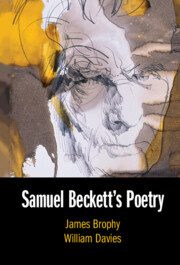Book contents
- Samuel Beckett’s Poetry
- Samuel Beckett’s Poetry
- Copyright page
- Contents
- Notes on Contributors
- Acknowledgements
- Abbreviations
- Introduction
- Chronology of Samuel Beckett’s Poetry
- Chapter 1 Weirdness and Dislocation in Beckett’s Early Poetry
- Chapter 2 Whole Fragments
- Chapter 3 Pre-echoing the Bones
- Chapter 4 ‘The Nucleus of a Living Poetic’
- Chapter 5 Beckett Growing Gnomic
- Chapter 6 Gender, Pronoun and Subject in ‘Poèmes 1937–1939’
- Chapter 7 The Missing Poème
- Chapter 8 Romanticism and Beckett’s Poetry
- 9 Romance under Strain in ‘Cascando’
- Chapter 10 Samuel Beckett’s Self-Translated Poems
- Chapter 11 Samuel Beckett’s Translations of Mexican Poetry
- Chapter 12 Beckett’s Poetry and the Radical Absence of the (War) Dead
- Chapter 13 Beckett’s Sound Sense
- Chapter 14 The Matter of Absence
- Chapter 15 ‘Mocked by a Tissue That May Not Serve’
- Chapter 16 Invoking Beckett
- Index
Chapter 13 - Beckett’s Sound Sense
Published online by Cambridge University Press: 15 December 2022
- Samuel Beckett’s Poetry
- Samuel Beckett’s Poetry
- Copyright page
- Contents
- Notes on Contributors
- Acknowledgements
- Abbreviations
- Introduction
- Chronology of Samuel Beckett’s Poetry
- Chapter 1 Weirdness and Dislocation in Beckett’s Early Poetry
- Chapter 2 Whole Fragments
- Chapter 3 Pre-echoing the Bones
- Chapter 4 ‘The Nucleus of a Living Poetic’
- Chapter 5 Beckett Growing Gnomic
- Chapter 6 Gender, Pronoun and Subject in ‘Poèmes 1937–1939’
- Chapter 7 The Missing Poème
- Chapter 8 Romanticism and Beckett’s Poetry
- 9 Romance under Strain in ‘Cascando’
- Chapter 10 Samuel Beckett’s Self-Translated Poems
- Chapter 11 Samuel Beckett’s Translations of Mexican Poetry
- Chapter 12 Beckett’s Poetry and the Radical Absence of the (War) Dead
- Chapter 13 Beckett’s Sound Sense
- Chapter 14 The Matter of Absence
- Chapter 15 ‘Mocked by a Tissue That May Not Serve’
- Chapter 16 Invoking Beckett
- Index
Summary
In his review of The Collected Poems of Samuel Beckett for the New York Times, Paul Muldoon condemns much of Beckett’s poetry as ‘dreadful stuff’ that suffers from a ‘half-done quality’ and is ‘fatally under the sway of his contemporaries in Irish modernism’. His focus is the early poetry, quoting ‘For Future Reference’, rejected by Beckett for inclusion in Echo’s Bones and Other Precipitates, and ‘Cascando’, Beckett’s late thirties love poem. No later poems are included.1 These are hardly fair representations of a writing life, but Muldoon is by no means the first to rubbish the notion that Beckett’s poetry is actually ‘poetic’.2 The common consensus is, rather, that Beckett’s poetry is found largely outside his poems. Responding to Muldoon, Douglas Messerli argues that all of Beckett’s works ‘represent, in one way or another, a kind of poetry in their attention to language above narrative and dramaturgical concerns’.3 Beckett’s work broadly is often described and celebrated as ‘poetic’, yet his reputation is not built on his poetry. It is unlikely that the Nobel Prize committee had the author’s published poems in mind when they described his work as ‘ghost poetry’.4 What, though, do we really mean when we describe Beckett’s writing as ‘poetry’? Messerli’s formulation is a useful starting point: ‘attention to language’. This entails not just the meaning of words but their shape and sound too. With that in mind, this chapter explores the role of sound and rhythm in Beckett’s writing to consider how his ‘poetry’ extends beyond the traditional boundaries of genre, particularly when it comes to the rhythmic and auditory qualities of the author’s late writing.
- Type
- Chapter
- Information
- Samuel Beckett's Poetry , pp. 203 - 218Publisher: Cambridge University PressPrint publication year: 2022



